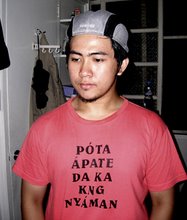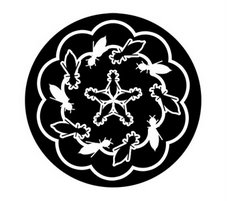I share sentiments with this one.
Do Not Be Ashamed to Save Your People (the case in UP)
By Dr. Jose Palu-ay Dacudao
"Believing in the inviolability of the small set of rules that they have managed themselves to acquire, they condemn others from a different dialect background, or who have not had the same educational opportunities as themselves, for not following those same rules.
Enthused by the Stalinesque policing metaphor, they advocate a policy of zero tolerance, to eradicate all traces of the aberrant behaviour. This extreme attitude would be condemned by most people if it were encountered in relation to such domains as gender or race, but for some reason it is tolerated in relation to language. Welcomed, even, judging by the phenomenal sales of Eats, Shoots and Leaves."
-David Crystal, British linguist
The hypocrisy of so-called Filipino nationalists in the University of the Philippines system sickens and nauseates me. They define their nationalism as:
:: A belief in a strong national (or central) government, or strong central government supervision. (Butuanon) Te, kun pro-Federal ka, indi ka na Pilipino?
:: A belief in imposing a uniform language on all Filipinos, in this case Tagalog. (Butuanon) Te kun indi ka gali Tagalog, indi ka na Pilipino?
:: A belief in anti-Americanism. Ang Amerika may Republican kag Federal nga gobyerno. (Butuanon) Te, kun pro-Republic kag pro-Federal ka, indi ka na Pilipino?
What is really sickening is that many of these so-called ‘nationalists’ fancy themselves as dissidents fighting against a monstrously oppressive system, when in fact they are the ones propagating the ideological basis for the monstrously oppressive internal colonialism to be found in Philippines.
You must be bewildered by now. So I will try to explain by means of concrete examples.
When I was a politically ignorant young Biology student in UP Diliman way back in 1980s, I became fascinated by UP teachers and students who went around proudly proclaiming their ‘nationalism’. It was so in vogue then, so radically chic. One day I attended a seminar by some of these self proclaimed nationalistic teachers. I cannot remember any of their lectures except one.
This nationalist teacher, very much respected by the nationalist students, stood up and right away commenced his lecture on nationalism and anti-American imperialism with the statement (in Tagalog of course):
“Please forgive my Tagalog. I am a Visayan and I cannot speak it well. I have a Visayan accent.”
The other listeners in the audience just nodded their assent as though it were the most natural thing in the world for him to say. I just stared in shock. I think my mouth had dropped open. It was the first time that I had encountered overt discrimination by UP nationalists against non-Tagalog Filipinos.
To make things worse, being a Visayan, I felt the discrimination in my very core, that it was against my person.
The honored teacher was apologizing for being a Visayan! What a dishonorable ethnic traitor he was!
Yet it was so much in vogue in UP then. To be a left-leaning Filipino nationalist (which I soon decided was just the same as being a Tagalista centralist opposed to any form of Federalism or devolvement of state powers to the provinces, and totally devoted to the destruction of the non-Tagalog ethnolinguistic peoples of the Philipines) was the rage, the stylistic fad, the fashionable mode, the trendy craze.
So I attended more seminars. The nationalists harped that American imperialism is bad, that American dominated multinational corporations were gobbling up the wealth of the Philippines and sending it straight to America.
Being of an inquisitive mind, I did not just nod my assent like a tick-tock automaton. I started thinking about the companies and corporations that I encounter everyday in the Philippines.
Eventually, I did a little research in the Securities and Exchange Commission, which lists down all the top Philippine companies. It turned out that more than 90% of the top Philippine companies and corporations were based in MetroManila. Most of the profits that they made in their provincial operations went straight to their executives and stockholders in MetroManila.
I decided to call these companies Manila Based Companies or Corporations (MBCs). Like Multinational Companies (MNCs) that the nationalists so hate, they suck in profits from their operations in peripheral areas and spew them out in their center, which happens to be MetroManila.
For years I waited for the nationalists to criticize MBC’s the way they attack MNC’s. Nothing. It was as though that there was nothing wrong with Manila plundering the rest of the Philippines, because such a thing never existed in the minds of the nationalists.
In additional seminars by UP nationalists, I learned that ‘imperialism’ is more or less synonymous with ‘neo-colonialism’ , and that it is bad. In imperialism or neo-colonialism, one country controls another by indirect economic means.
Even worse was colonialism, which was direct political control of a colony by a ‘mother country’, which placed the colony under the direct supervision and control of a government apparatus whose upper echelons were located in and were loyal to the mother country.
In such a case, the center in the mother country could legally direct events, implements its laws, and unilaterally tax the peoples in the colony.
I was dumbfounded. Using this definition of colonialism, all Philippines provinces are colonies of MetroManila!
As usual I did a little investigation. I learned to my amazement that an article in the Encyclopedia Britannica agreed with me, claiming that when Europeans withdrew direct political control of their African and Asian colonies in the late 1800s and early 1900s, control of the typical colony usually passed on to the city that functioned as the colonial capital. The ethnic group in control of this capital then often became the new colonizers. The Encyclopedia Britannica article called this system of exploitation ‘internal colonialism’.
A bitter hostility to American imperialism coupled with a deliberate obliviousness to the internal colonialism going on in the Philippines was almost pathognomonic of the UP nationalists of the 1980s, and perhaps even until now.
Another characteristic of Tagalista UP nationalists is that they seem to pretend that the Philippines’ non-Tagalog ethnolinguistic peoples do not exist. They go about bashing English, then advocating its replacement by Tagalog, deliberately ignoring the fact that Tagalog was forcibly first imposed by the Manila-based Japanese puppet government of World War II on non-Tagalog Filipinos.
Executive Order No. 44 issued by collaborationist President Jose P. Laurel, ordered the integration of Tagalog into the core subjects of the University of the Philippines.
As usual, in this deceitful act of internal colonialism UP led the way. Other schools followed suit. The above action of the Japanese and their colonial puppets was completely illegal in the sense that the framers of the 1935 Philippine Constitution specifically refused to recognize Tagalog as a national language in the Philippine Constitution, as it was and is clear that doing so would discriminate against non-Tagalog Filipinos and turn them into second class citizens. In imposing and enforcing Tagalog, the Japanese also never held any plebiscite, or any democratic process.
The main motive of the treasonous World War II Filipino ‘nationalists’ (who were actually Tagalistas) then were the same as now: the replacement of English by Tagalog as the Philippine’s lingua franca in the name of National Unity and anti-colonialism.
Irony of ironies!
The enforcement of Tagalog was actually not an anti-colonial action, but a weapon of colonialism itself, the better that a central Unitarian government from Manila could colonially control the whole Philippines.
Unlike many UP students who swallowed all the nauseating nationalistic baloney like starving robotic morons, I started analyzing this ‘nationalism’ that many ‘nationalist’ UP teachers and students advocated. As stated above, it seemed to have three main components.
:: A belief in a strong national (or central) government, or strong central government supervision.
:: A belief in imposing a uniform language on all Filipinos, in this case Tagalog.
:: A belief in anti-Americanism.
Blind force feeding of this rotting nationalistic baloney gave me severe indigestion. Where the heck lies the loyalty of the nationalistic UP educator, to Manila or to the rest of the Philippines?
In my opinion, there is a real need to reform the UP system of education in the matter of ideological orientation with regards to the idea of what the Philippines was, is, and should be.
The reader might ask, why am I attacking UP so much when I myself am one of its products? I graduated magna cum laude in Biology in UP Diliman, and finished Medicine in the UP College of Medicine Manila. I have spent more than 10 years of my life in UP.
Naturally, I gain no pleasure in criticizing the school that trained me to be me. I naturally hope and pray that UP would get reformed sometime in the future so that it would cease being the instrument of internal colonialism that it has been since World War II.
The reason is simple enough. This ‘nationalism’ being advocated by many UP teachers and organizations will one day be the death of the non-Tagalog ethnolinguistic peoples of the Philippines. The UP type of nationalism is in essence Tagalista internal colonialism.
In our case here in Iloilo, this type of ‘nationalism’, if unopposed, will cause the Ilonggo people to die out.
History is rife with cases of colonialism. The colonizer normally tried to impose his language, and with it his ethnic identity, on the colonized. Colonized ethnic peoples (captive peoples, peripheral peoples) who could not or would not resist disappeared.
What does this mean?
If you want your people to survive, do not be ashamed to save your people. Speak out for them, however wrong it may seem by society’s prevailing standards.
(And this I am doing; I hope you do it, too, students of 1) University of the Philippines Extension Program in Pampanga, 2) UP Aguman, 3) UP Cabalen. -Jason)
Alben meng manyaman, boy!
Subscribe to:
Post Comments (Atom)








No comments:
Post a Comment